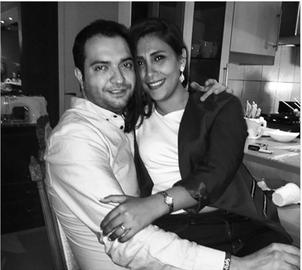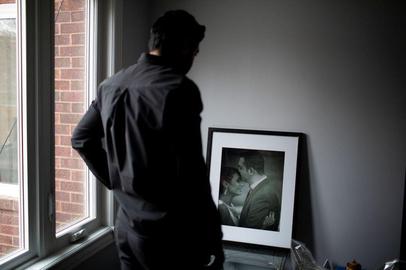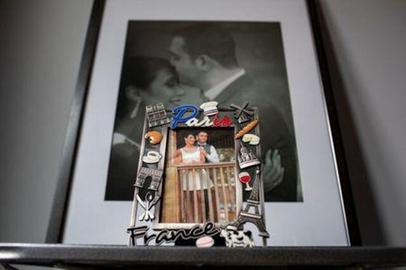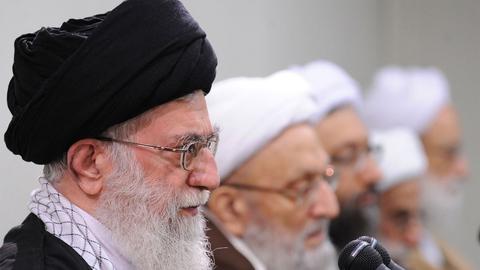On January 8, 2020, a Ukrainian Airlines passenger aircraft was shot down over Tehran by two missiles launched by the Islamic Revolutionary Guard Corps. The tragedy, which Iran still insists was the result of "human error", claimed the lives of all 176 people onboard and pitched their families and loved ones into a living nightmare - one they are still living through today.
Among the innocent civilians on Flight 752 were 82 Iranian citizens, 63 Canadians,11 Ukrainians, 10 Swedes, seven Afghans, three Britons and three Germans. They included doctors, students, athletes, activists and environmentalists: individuals pursuing their own dreams and ambitions both inside and outside Iran, and with bright futures ahead of them.
An international investigation into the incident is underway, spearheaded by Canada, France and Ukraine. But in the meantime, the devastated families of the PS752 passengers are still in limbo. Bereft of either justice or accountability for the disaster that shattered their lives, some of these individuals are now being represented by the Association of Families of Flight PS752 Victims, which has published a series of heart-rending personal letters and testimonies to honor those who were killed on January 8.
IranWire is supporting the Association's fight for justice by translating these final tributes into English and publishing them on our pages. We hope that through these efforts, the remarkable lives and aspirations of those aboard Flight 752 will not be forgotten.
Mohsen and Mahsa, My Tall Shadows
For Mohsen Salahi and Mahsa Amirliravi, PS752 Passengers
By Roya Maleki
I till the ground with a bulldozer. You are not here and I want to find you. I remember the day you came to life in a feverish Ahvaz, 31 years ago. With your large and black eyes, your long fingers, a height taller than a one-day-old infant should be. You were smiling. You were kind.
“The Karun River doesn’t get salty,” your mother said. “My Mohsen is funny as salt, as the Persian expression goes.”
She was right. You were the Karun, with a heart as big as our mighty river. Giving like the river, flowing like the river. Loving and quiet with a smile forever on your face. The same smile that is now emblazoned on our walls, staring at me with those playful eyes that never blink and keep drawing me back to memories of childhood.
I remember the double-layered balls, the gates without nets, the mini football games and the bets on an ice-cold soda in our hot and febrile city. I remember our moving from place to place: from Ahvaz to Arak, from Arak to Tehran and, eventually, to Canada.
I can’t believe I am using the past tense. The past will never be the past for me. Do you remember you were still a kid, fifteen years old or maybe sixteen (does it matter?), either way, still a teenager, when you left your homeland? Everyone said you were my shadow and would follow in my footsteps. That you’d go wherever I went. Everyone was convinced you were my shadow. But you weren’t. You were life. My dearest brother, you weren’t a shadow behind me, you were a shadow watching over me, keeping me safe.
Whenever I stare into your eyes in the picture on the wall, I pinch myself and wonder, am I still alive? How have I not died of sadness? How have I borne so much death, so much mourning? Nothing can save me.
Everything passes slowly. Everything is soft, senseless. I am left with a thousand whys, a thousand hows, a thousand unanswered question marks that eat up my life and my soul like ants consuming a corpse.
My dearest brother, my life!
Your absence has caused so much torment. In the midst of it all, every day, I lie here on this goddamned couch, and I summon up all my strength to think of you. Of all that you were. Of your ceaseless kindness. Of your caring for the poor children of Africa. Of you going crazy over the latest technology. Of you being impatient for little friendly get-togethers.
I come here every day, to the corner of a room full of your absence. In order to remember the days of your existence, I go down every untrodden path. I sit in this corner and consider how empty my hands are without you. Three decades of your life march in front of my eyes. What a life! Full of events. How short, how sad. My son, Mohsen, who was both born and named after you, cries sometimes. I hug him like a long-lost brother returning from a trip.
Believe me when I say this: I still don’t believe you are gone. How did I get here? Where in the world am I? Why should I be here, in a faraway land, wallowing in loneliness without you?
Do you remember when you came to Canada and began studying relentlessly? You went to Toronto’s Ryerson University, the same place where you found the love of your life. Mohsen! How good it is that you fell in love. Nothing gives hope to the heart like love. Love gives you life. You know what? I think love is both the starting point and the destination.
How good that you fell in love, too, with a girl who was guilelessly kind. My dearest Mahsa. A beautiful, charming girl with hair as black as coal. I see her every day in her white dress, more beautiful than ever, with a bridal crown on her head and with red lipstick on that gave extra color to her laughter. With a white bouquet of flowers in her hands. Her body moving freely in your arms. Both of you in a framed photo on the wall. Both of you laughing. Both of you happy.
But I still shed tears every time I see your laughter in its frame. As if a hundred women crouch in the depths of my heart, tugging on its strings while washing their clothes. I am restless, full of chaos. Sadness is not a piece of black clothing that I can just take off again. The sadness of your absence sits in my very soul. My back bends, right where they say it should bend when you lose a brother. Still, when I say you name, my heart burns with a fire which Abraham himself wouldn’t come out of alive.
Dear Mohsen!
It’s as if I haven’t seen you in a hundred years. Last night I was agitated, pacing the room. They call you a martyr now. In which war were you martyred, my dear brother? A war on ourselves? On which front did you fight, my unarmed soldier? Whose barricades were you defending, my defenseless soldier? In what unequal conflict did you serve, for me not to retrieve so much as a dog tag, not so much as a piece of your shirt?
I damn the fingers that pushed that button. Not once, but twice. Did his hand not shake? Forget his hand. Did his heart not shake before shooting down 176 lives?
Just like a soldier who stands in the firing squad but whose heart and hands quiver before the order comes. He does not want to take the first shot, nor does he want his bullets to hit a heart. He aims the gun at the feet. He remembers the look of his mother, the love of those waiting for him, and he doesn't’ shoot.
It matters, my dear Mohsen. It does. I say the person who shoots the first bullet is the murderer, and the one who wants to shoot last might well be a man in love. He can’t bring himself to do it; his hand shakes. The man who pushed the button to fire the missiles wasn’t in love. He was the acolyte of a butcher, and he was a butcher himself, drunk on the rank smell of blood. He erupted. And then he denied everything without shame. He knows nothing of true love. Nor has he known the bitter taste of missing someone you love.
He knows nothing of a calm embrace, nor of caring for a wife, a child. He smells only blood and bullets. He smells hatred and the sharp tang of wretchedness. He smells total war. But he does not know who the enemy is. In his eyes, everybody, even you, is the enemy. Even the kind Mahsa. Even Siavash, to whose peaceful nature the Book of Kings testifies.
I wish I knew that soldier. Does that soldier, with his mistaken fingers, still sleep peacefully at night?
Or does he dream of the little eyes of Reera, in the pictures Hamed nails to his Facebook wall every day? Does he see my Mohsen, growing up without an uncle?
He dreams of you, with your inimitable laughter. He dreams of Siavash and of the beautiful Sara in her white dress. He dreams of Ghanimat, who loved nature, and who, like her namesake, became the bounty of an imagined war. He dreams of Rastin, of Maya, of Shahrzad, of Parsa, of the 176 Mahsas and Mohsens who were the lives and loves of so many more people.
Dear Mohsen! I’ve said your name so many times that I only repeat myself now. Like a broken record, I keep going over our last conversation.
“Where are you, dear Mohsen?”
“We’re on the plane, waiting to fly.”
“I’ll see you in the morning then. Take good care of yourself.”
How bitterly useless these words were: “Take good care of yourself.”
Didn’t I ask you not to go? But you loved Iran. You loved that land. And finally you left your body and soul right there, in a corner of a land that was your home. A stricken land; a land beset by evil, shrivelled souls that can only assert themselves down the barrel of a gun.
The evil man has a blank mind but a great many words. He has an empty heart but a gun full of bullets. All of his brutality is hidden under a cloak. He quotes the Qur’an only so as to make the halal forbidden and the forbidden halal. He has put truth in chains. He spits forth lies every day. The evil man struggles pathetically in his attempts to prolong his life. He divines his survival in war.
If only he had read an earthly book instead of his heavenly one. If only he had read a romance novel or a manual on how to raise a child, how to learn to love. If only he had read fiction and the tales of others. If only he could see what violence does to people.
If only the evil man used his uncensored Twitter account to chart a hashtag shared in the name of justice. If only he had read just one of the tales of love for the 176 beloved souls on that flight.
I want someone to take a scan of my chaotic heart and show it to every doctor in the world. I want the picture of my bloodied heart shown in every medicine class, so they can see how this heart burns.
Dear Mohsen!
We stand for justice, for you to be avenged.
We cannot forgive. We are too full of remorse. We ask questions; just one answer would suffice. For what sin did you shoot, not once but twice, at 176 loving hearts? In which war did we create 176 new martyrs? Why, then, did you deny it? What has happened to your tongue? How can you try to excuse a crime that made you more infamous than ever before?
My dearest brother! After you, I won’t forgive. I will only ask questions.
Translator: Arash Azizi
Editor: Hannah Somerville
visit the accountability section
In this section of Iran Wire, you can contact the officials and launch your campaign for various problems






























comments